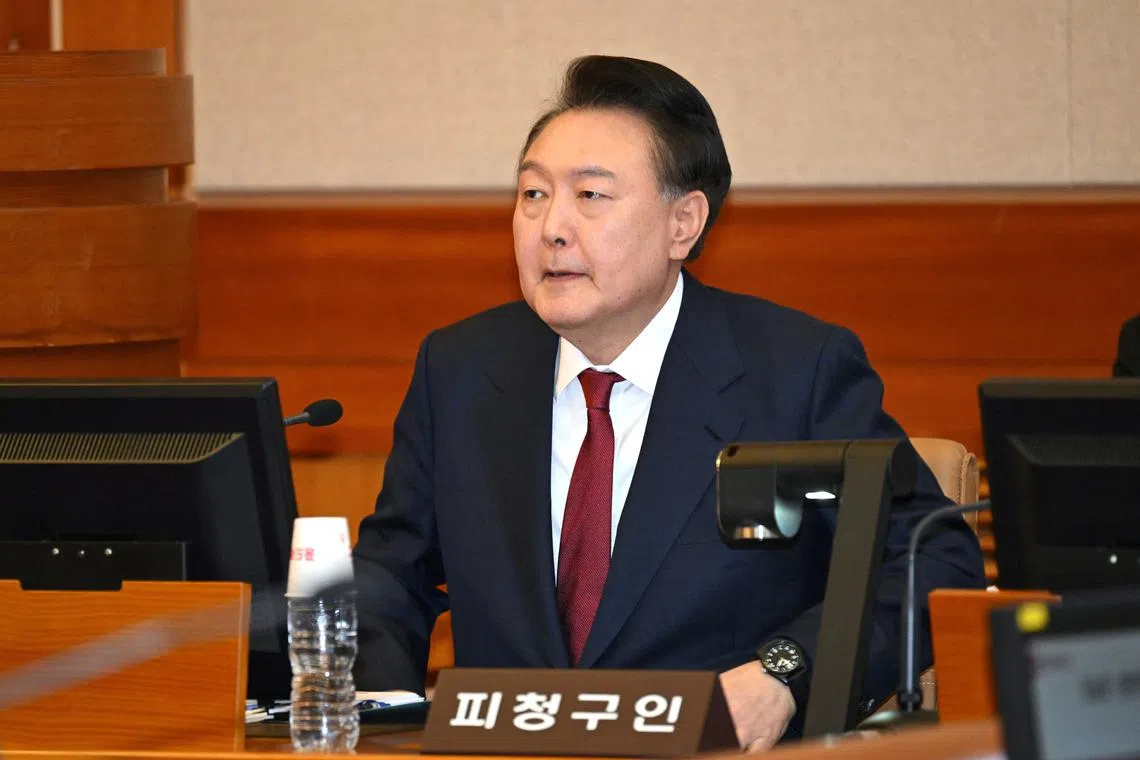South Korean military officer says he believed President Yoon’s martial law ‘legitimate’
Sign up now: Get insights on Asia's fast-moving developments

The officer declined to say if impeached South Korean President Yoon Suk Yeol (above) gave orders to "drag" lawmakers out of Parliament.
PHOTO: REUTERS
Follow topic:
SEOUL – A top South Korean military commander said on Feb 4 he trusted President Yoon Suk Yeol to be making a legitimate decision when he declared martial law, but declined to say if the impeached leader gave orders to “drag” lawmakers out of Parliament.
Army Lieutenant-General Lee Jin-woo testified at a Constitutional Court trial reviewing Parliament’s impeachment of Mr Yoon, who is accused of masterminding insurrection with his short-lived martial law decree
Mr Yoon again played down his martial law declaration, which shocked the country and plunged the industrial powerhouse and a powerful example of democratic resilience into a constitutional crisis that also saw the prime minister impeached.
“I still believe it was legitimate and when told to go to Parliament, I considered it to be an order,” Lee told the court.
“There was no chance to even think about whether it was illegal or unconstitutional, when the commander-in-chief, who represents the people, and whom I knew to be a legal expert as a former top prosecutor, spoke to the country and to the world.”
The Constitutional Court is reviewing Parliament’s impeachment of Mr Yoon on Dec 14 and will decide whether to remove him from office permanently or reinstate him.
If he is removed, a new presidential election must be held within 60 days.
Prosecutors have separately indicted Mr Yoon on charges of leading an insurrection. He was arrested in January
Lee, who was the commander of the Army Capital Defence Command, is among a number of senior military and police officers who have been accused of insurrection and abuse of authority.
Questioning Lee and other witnesses in court was focused on allegations that Mr Yoon had given an order to arrest politicians.
Mr Yeo In-hyung, who headed the defence counter intelligence command, said he had opposed martial law but could not help but comply with the commander-in-chief’s decision.
He refused to answer questions about whether he had a list of politicians to arrest.
Mr Yoon attended the court hearing on Feb 4 and said there was no point in debating whether he gave orders to remove lawmakers gathering to vote to lift the martial law when “nothing actually happened”.
Lee and Mr Yeo declined to answer many of the questions, including whether Mr Yoon had ordered troops to use firearms if necessary and break into Parliament to remove the lawmakers, saying they were defendants in criminal trials.
However, Mr Hong Jang-won, another witness who is a former deputy chief of the National Intelligence Service, said Mr Yoon had ordered him to “catch them all and clean up everything”, without specifying who to catch.
Since the president had asked him to help Mr Yeo’s command, Mr Hong said he spoke to Mr Yeo who gave him a list of politicians to arrest.
“I still don’t understand why (they) tried to arrest and investigate these people,” he said.
Looking at Mr Yoon, Mr Hong told the court Mr Yoon should have made a sincere apology to the people.
Immediately after Mr Hong’s testimony, Mr Yoon flatly denied his allegations.
A copy of the indictment against Mr Yoon seen by Reuters said Mr Yoon allegedly asked the safety minister to cut off power and water to several media outlets considered to be critical of the conservative leader. REUTERS

